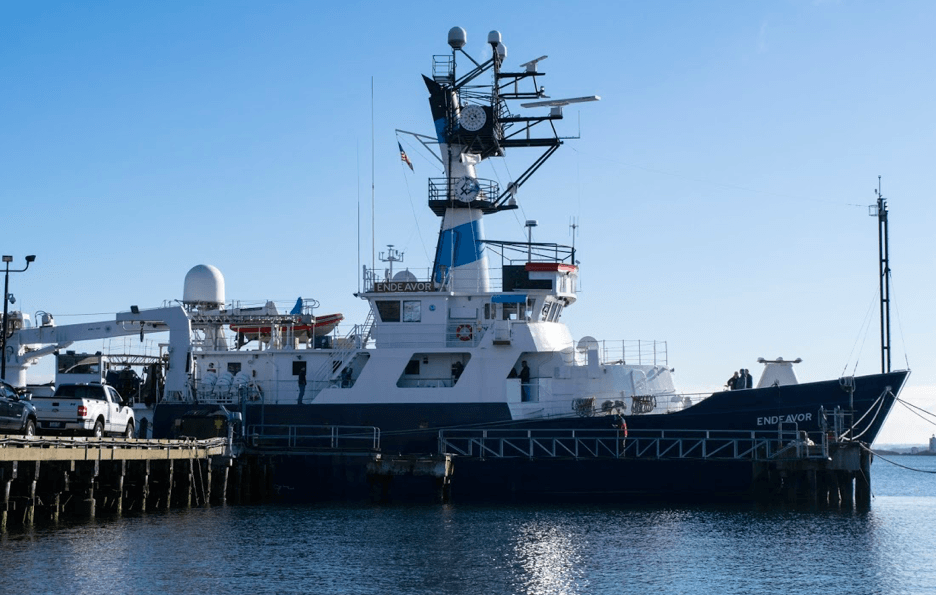Expedition will take students along the New England coast
On April 18, several students will be traveling on the Endeavor to study plankton and whales along the New England coast. | Photo by Anna
The Graduate School of Oceanography is allowing undergraduate honors program students to embark on a six-day expedition on their research vessel, “The Endeavor.”
The expedition will begin April 18. Students, along with professors, scientists and researchers, will be traveling the New England coast and near Nantucket Island to study plankton and whales in the area. Students will also learn what it is like to be a researcher in the field.
According to Holly Morin, a marine biologist, there are two goals of the trip. The primary goal is to study the feeding habits of the North Atlantic right whale, a critically endangered species with only about 450 left in the wild.
Morin explained that this is the third year in a row that this trip has taken place and that this year is being used as a follow-up from the discoveries of last year.
She said that North Atlantic right whales feed on a very specific sort of plankton, called Calanus Copepods. Although not many were found in the waters last year, the right whales still migrated to New England, and have actually been in the area longer than usual this year.
“Now the question is, ‘If they’re not feeding on their usual plankton prey, what are they feeding on?’” Morin said.
Morin also mentioned that the whales’ migration patterns had previously remained the same for years, but migration patterns have now begun to shift. The whales are being spotted in different areas of New England, such as off of Nantucket Island.
“There’s something there that’s keeping them there so we’re hoping to figure that out,” Morin said.
Morin said this could be partially due to climate change, but it is too early to tell.
There will be about 12 undergraduate honors students participating in this expedition. The students themselves come from all different backgrounds and majors, but many have little to no experience in doing this type of work. In fact, the trip being part of the class came as a complete surprise to some of them.
“It was very unexpected,” said Nick Houseman, a senior marine biology major going on the trip. “It was not something that I was aware of when I signed up for the class. I think a couple of weeks after signing up for it we got an email from the professor [about going on the trip]. That was very exciting.”
Houseman said that the majority of the class has been used to make their own research equipment for the trip. One of these pieces of equipment is specific time-lapse camera called a Video Plankton Recorder (VPR).
Morin said a VPR uses a strobe light to take 60 pictures per second of the plankton on the water. The cameras will be deployed in what Morin describes as a “string of pearls.” This means they will each have round, hard casings to protect them from water pressure and will be released as a “single upright vertical chain.”
Morin explained that this ties into the second reason as to why this expedition is necessary. It is being used as a sort of test to see if this inexpensive piece of equipment can be used by the public.
“Unfortunately, ocean science is expensive,” said Morin. “So anytime scientists can reel things back in and make it accessible for anybody, it’s a big deal.”
Houseman said that he is learning many more aspects of being a scientist in the class. He said he has learned the communications side of science when they create public service announcements related to what they will be researching.
“There’s amazing science that’s always happening,” she said. “If you don’t share your discoveries, nobody knows about them.”
The students will continue to learn science communication while they are on their expedition. On April 22, which is Earth Day, they will be live streaming right from the vessel and connecting with school groups throughout the day by answering their questions. There will also be two Facebook Live sessions called “Endeavor Live!” at noon and 5 p.m.
“That’s what really makes these cruises different,” Morin said. “Now you’re kind of engaging with the next generation of scientists and you’re getting them excited… It’s not just some isolated science event. It’s that we’re connecting with a lot of different people and engaging them in the research.”
Houseman was excited about the opportunity and experience.
“I think it’s really good to get the practical experience because this is more similar to what people are actually doing for jobs and for work than just learning concepts like what you do in a lot of other classes,” he said.

